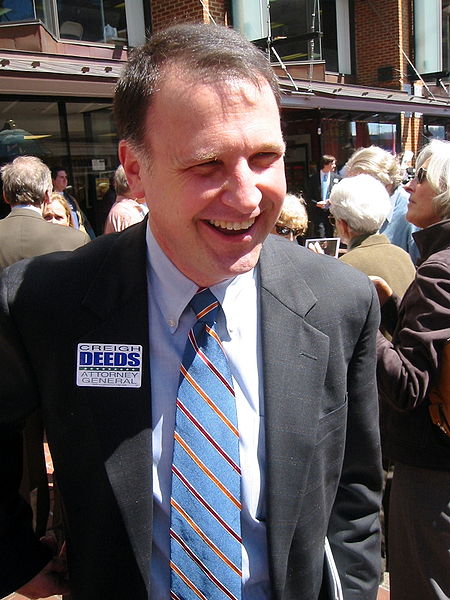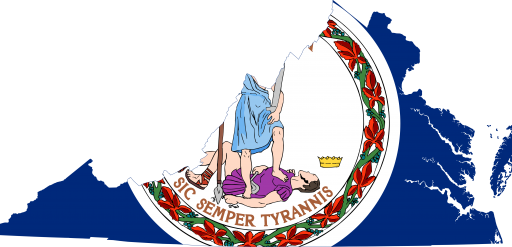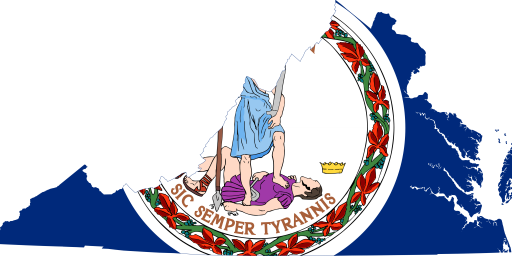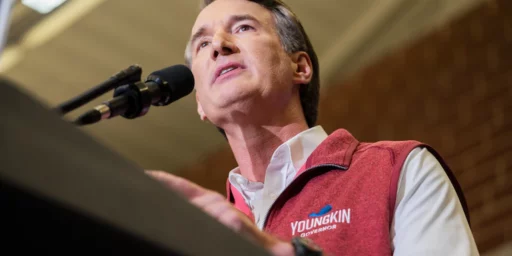Virginia Governor Primary: Deeds Trounces McAuliffe and Moran
 While I live in Virginia, I’ve paid only scant attention to what has been a lackluster governor’s race. But the polls suddenly shifted a couple days ago and it appears that the general election will be interesting, indeed.
While I live in Virginia, I’ve paid only scant attention to what has been a lackluster governor’s race. But the polls suddenly shifted a couple days ago and it appears that the general election will be interesting, indeed.
Running with the least money and fewest ties to vote-rich Northern Virginia, State Sen. R. Creigh Deeds has won the three-way Democratic primary for governor, paving the way for a rematch with Republican Bob McDonnell in the fall.
Deeds, 51, a country lawyer from Bath County in the western part of the state, was viewed as an unlikely winner against two Northern Virginians with entrenched political ties. Known for his moderate views on such issues as gun rights, but also appreciated for his folksy style and attention to the Washington suburbs’ cry for road improvements, Deeds was leading in Fairfax, Arlington, Loudoun and Prince William counties. Deeds had almost doubled the vote totals of each of his opponents, Democratic activist Terry McAuliffe and former Del. Brian Moran.
“Three weeks ago, this was a two-man race between McAuliffe and Moran,” said Quentin Kidd, a political science professor at Christopher Newport University. “Deeds was going to win the rural vote and that’s it. People are going to be talking about how he pulled this off for weeks and months.”
Deeds, a 17-year veteran of the General Assembly, lost by a mere 323 votes to McDonnell in the 2005 election for attorney general. His victory today presents Republicans with a different challenge than they were expecting: a moderate with strong ties to rural voters and a political apparatus throughout the state.
The GOP was preparing for battle with McAuliffe, whom they hoped to portray as a big-money fundraiser for former president Bill Clinton and a carpetbagger who had never been active in Virginia politics before this year. And Moran, who represented one of Virginia’s most liberal communities in the House of Delegates, was vulnerable because of such positions as his advocacy to repeal Virginia’s ban on gay marriage.
But with Deeds, the race is more likely to boil to which candidate does a better job appealing to such bread-and-butter issues as job creation, traffic and who would better manage the state. McDonnell, a longtime conservative lawmaker from Virginia Beach before he took statewide office, has run a campaign thus far centered on exactly those issues.
With money expected to pour in from both political parties and out-of-state donors, the race should be well-funded in a year with only one other major election — a governor’s race in New Jersey.
Though I’ve lived in Virginia for the past seven years, McAuliffe was the only candidate I had paid any attention to before the campaign started and only because of his career as a Democratic Party apparatchik. Moran’s name was familiar, but only because his brother Jim had been my Congressman.
Virginia is an odd state in that it allows governors to serve only one consecutive term. That dramatically narrows the field as, for example, most United States Senators and even Representatives are unlikely to be willing to leave their relatively secure posts for four years in Richmond. Still, the field was particularly lackluster this year. McAuliffe was a carpetbagger hoping to buy his way in and Moran and Deeds were mere state legislators.
Deeds at least had some statewide name recognition from his failed AG bid. But, interestingly, he was considered an also-ran a couple weeks ago.
While McAuliffe had been the favorite, simply because he had so much money, he alienated a lot of folks with his heavyhanded campaigning. The state was quite literally littered with his signs and this annoyed a lot of folks.
UPDATE: Chris Cillizza picks the “Winners and Losers” from the contest.
WINNERS
Deeds Ads: For a candidate little-known statewide and suffering a significant charisma deficit to at least one of his opponents, Deeds’s ads were of critical importance in introducing himself to Virginia voters and making the case why he was the natural heir to the political legacies of Mark Warner and Tim Kaine. Thanks to David Dixon and Rich Davis, who have been with Deeds since he lost the attorney general’s race by 323 votes in 2005, the nominee’s ads stood out from the pack. Crisp and clean they cast Deeds as something of an everyman — the kind of guy who is easy to vote for. Need to see what we are talking about? Go watch the Deeds ad touting his endorsement by the Washington Post.
Mainstream Media: Just when you thought we were dead and buried. . . . Ask anyone involved in the race what the critical moment was when things started to move for Deeds and they will tell you — to a person — it was Friday May 22 when the Post endorsed the state senator. “The defining moment in this campaign occurred in a conference room at the Washington Post,” said Chris Cooper, a Democratic consultant at Knickerbocker SKD who has worked extensively in Virginia. Proof of the power of the Post endorsement? Deeds carried the three northern Virginia congressional districts — including the seat held by Rep. Jim Moran, the brother of former state Del. Brian Moran. No one would have thought that possible even a few weeks ago.
Momentum: In primaries, momentum tends to be a major factor. Since the candidates have few differences on the issues, most voters and elected officials like to wait until the end to make up their mind and then go with whichever candidate has the look of a winner. That’s clearly what happened in this race as Deeds scooped up massive swaths of undecided voters across the state — not to mention a handful of influential state senators — in the final days of the contest. Once Deeds got rolling, it was impossible to stop him because the three candidates largely agreed on issues; voters were siding with the winner and that sentiment turned what was once a close race into an absolute landslide.
Joe Abbey: While both McAuliffe and Moran had bigger names at the heads of their campaigns, it was Abbey, Deeds’s campaign manager, who wound up on top. As early as February, an influential Virginia politics blog — ingeniously named “Not Larry Sabato” — wrote a post pointing to the changes Abbey had made since coming on in December 2008 that managed to keep Deeds in the game. Given the importance of Virginia in the 2012 electoral landscape, Abbey is now in a position to write his own ticket when it comes to his next job.
DGA: The Democratic Governors Association got their ideal candidate in Deeds — a moderate from the rural, western part of the state who will be tough to label as just another Democratic liberal. That doesn’t mean Republicans won’t try — they were already hitting Deeds last night for his votes in the state Senate to raise taxes — but Deeds is a much more difficult target than McAuliffe, certainly, and even Moran would have been.
Headline Writers: The semi-oddness of Deeds’s name — first and last — makes for a field day for the ink-stained wretched who have to pour all of their creative juices into a few words. Jim Hobart, who works at the Republican polling firm Public Opinion Strategies, offered up a few gems based off of the Deeds’s victory on Tuesday night. Among them: “Yes inDEED!”, “Mr. Deeds goes to Richmond?” and, our personal favorite, “InCREIGHdible”.
LOSERS
McAuliffe’s Ads: The Macker’s competitive advantage in this race was his fundraising capacity, which allowed him to get up on television months before Deeds or Moran. And yet, there isn’t a single ad that proved particularly memorable even though McAuliffe insiders insist the commercials did move numbers (not enough, apparently). We also wonder whether it was a strategic mistake for McAulliffe to talk so much in his own ads; his accent made him sound like he was running for mayor of Syracuse — we are on record as first to float the idea! — rather than governor of Virginia. Don’t dismiss the importance of how a candidate sounds in his (or her) ads; Republican strategists acknowledge that Jerry Kilgore’s accent hurt him badly during his own 2005 gubernatorial bid in Virginia.
Brian Schweitzer: Why the heck did the chairman of the DGA fly from Montana to Virginia to not only endorse McAuliffe but travel the state with him? We didn’t understand it when it happened and we understand it even less now. Schweitzer is ambitious and won a lot of hearts for his stemwinder at last year’s Democratic National Convention. But, the McAuliffe endorsement is rightly seen as a blemish on what has been a sterling electoral record for the Montana governor. Kudos to the Republican Governors Association for their well-timed press release on the subject last night; “Congratulations on your victory tonight,” said RGA Communications Director Mike Schrimpf. “FYI, the DGA will be calling you soon . . . they’re real sorry about that endorsement of Terry McAuliffe last week,” joked RGA spokesman Mike Schrimpf.
Brian Moran: Moran had been laying the groundwork for this race for years and, prior to McAuliffe getting into the contest, was widely seen as the likely Democratic nominee. Instead, he finished third and lost every congressional district in his supposed base. What happened? Moran seemed never to get over the idea that McAuliffe was running for governor; he focused so much of his time and energy on proving that the Macker was a carpetbagger who was ill-suited to be governor that he never made a positive case to Virginians for why they should choose him.
The Clinton Legacy: Not only did McAulliffe, the national chairman for Hillary Clinton‘s presidential campaign, lose in his first run for elected office but so too did Adam Parkhomenko, the wunderkind who came to prominence as HRC campaign manager Patti Solis Doyle’s assistant during the 2008 campaign. Parkhomenko, who was running for the 47th district House seat, wound up placing third behind winner Patrick Hope. While Clintonites may never set foot in the Ballston Westin hotel again — the site of McAulliffe’s “victory” party and countless events for the New York senator during the campaign — it’s almost certain that Parkhomenko will be heard from sometime soon in Commonwealth politics.
Sounds about right.
Unfogged‘s Stanley cast a strategic ballot with a visceral twist:
In a vote based solely on their political positions, I’d vote for Moran. He ran to the left, and I’m right with him on those issues. But he wasn’t going to win.
At the end of the day, I voted against McAullife. I just don’t like him, and it’s the first time I’m voting on that sort of gut reaction.
So I voted for the guy that could beat him, Deeds, even though he was probably the most conservative guy in the race.
My strong sense is that quite a few people voted against McAullife.
Patrick Ruffini — who consults for Republican nominee Bob McDonell — thinks the results signal the end of the old era of money in politics.
How many times do I have to say it? In the modern campaign, early money and establishment support matters far, far less than it used to, and could actually turn out to be a handicap — particularly when money becomes the story.
Campaigns like McAuliffe’s that are focused above all else on money, and that put out self-congratulatory press releases about their “grassroots organization” and their Noah’s Ark of big-name consultants, frequently forget that money can’t buy two other M’s: message and momentum.
[…]
The moral of the story is not to run an ascetic campaign for its own sake, but to realize that money and political success are growing more and more intertwined. This is not 1988 or 1992, when a Paul Simon or Paul Tsongas could have a surplus of political success combined a deficit of money, strangling their upstart campaigns in the crib. Today, the money comes in virtually instantaneously online at the first hint of success. The McAuliffe model of banking money early to generate momentum later through ads is broken. The new model is to generate organic opportunities for momentum first then monetize them, punching through the finish line in a final blitzkrieg at the end.
It also doesn’t help to have a grating personality.




I’m sure his accent, evident in his TV ads, didn’t do McAuliffe any favors, either.
It seems to me that being well funded in a campaign is a necessity…until you are so over funded or you outspend your opponent by large enough margins that it becomes an issue. I wonder if that happened?.
To some extent. Rich candidates always get the “trying to buy the office” argument and McAuliffe gave opponents fuel for that fire. Major thoroughfares had hundreds of his signs, for example, crowding out his opponents’. That was rather annoying.
It’s interesting that Patrick puts so little weight on money, given the last I heard … just a few days ago, now… McDonnel had around a 10 to 1 advatage on money over Deeds.
OTOH I should also point out that every poll I’ve seen shows McDonnel with a handy lead over all comers, inclduing Deeds, who has some pretty high negatives.
Mr. Ruffini seems to be drawing some awfully questionable conclusions from one data point, as well as potentially committing a post hoc ergo propter hoc kind of error. Would Mr. McAuliffe had been more successful with less money? Or is it possible that the populace of Virginia knew enough about him without having to rely on his purchased propoganda and rejected him utterly?